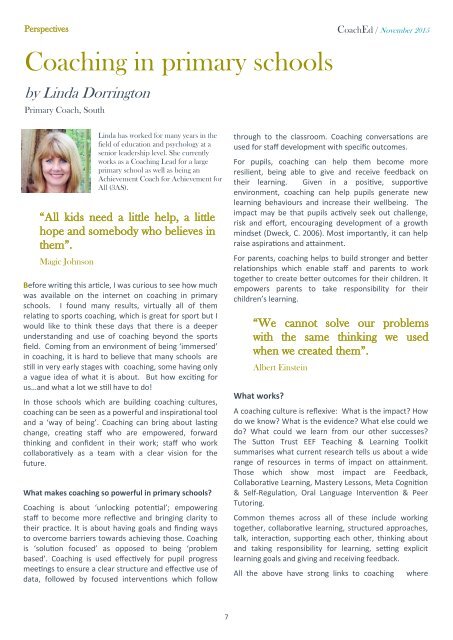The Teaching Leaders Coaching Journal
21dX4iN
21dX4iN
You also want an ePaper? Increase the reach of your titles
YUMPU automatically turns print PDFs into web optimized ePapers that Google loves.
Perspectives<br />
CoachEd / November 2015<br />
<strong>Coaching</strong> in primary schools<br />
by Linda Dorrington<br />
Primary Coach, South<br />
Linda has worked for many years in the<br />
field of education and psychology at a<br />
senior leadership level. She currently<br />
works as a <strong>Coaching</strong> Lead for a large<br />
primary school as well as being an<br />
Achievement Coach for Achievement for<br />
All (3AS).<br />
“All kids need a little help, a little<br />
hope and somebody who believes in<br />
them”.<br />
Magic Johnson<br />
Before writing this article, I was curious to see how much<br />
was available on the internet on coaching in primary<br />
schools. I found many results, virtually all of them<br />
relating to sports coaching, which is great for sport but I<br />
would like to think these days that there is a deeper<br />
understanding and use of coaching beyond the sports<br />
field. Coming from an environment of being ‘immersed’<br />
in coaching, it is hard to believe that many schools are<br />
still in very early stages with coaching, some having only<br />
a vague idea of what it is about. But how exciting for<br />
us…and what a lot we still have to do!<br />
In those schools which are building coaching cultures,<br />
coaching can be seen as a powerful and inspirational tool<br />
and a ‘way of being’. <strong>Coaching</strong> can bring about lasting<br />
change, creating staff who are empowered, forward<br />
thinking and confident in their work; staff who work<br />
collaboratively as a team with a clear vision for the<br />
future.<br />
What makes coaching so powerful in primary schools?<br />
<strong>Coaching</strong> is about ‘unlocking potential’; empowering<br />
staff to become more reflective and bringing clarity to<br />
their practice. It is about having goals and finding ways<br />
to overcome barriers towards achieving those. <strong>Coaching</strong><br />
is ‘solution focused’ as opposed to being ‘problem<br />
based’. <strong>Coaching</strong> is used effectively for pupil progress<br />
meetings to ensure a clear structure and effective use of<br />
data, followed by focused interventions which follow<br />
through to the classroom. <strong>Coaching</strong> conversations are<br />
used for staff development with specific outcomes.<br />
For pupils, coaching can help them become more<br />
resilient, being able to give and receive feedback on<br />
their learning. Given in a positive, supportive<br />
environment, coaching can help pupils generate new<br />
learning behaviours and increase their wellbeing. <strong>The</strong><br />
impact may be that pupils actively seek out challenge,<br />
risk and effort, encouraging development of a growth<br />
mindset (Dweck, C. 2006). Most importantly, it can help<br />
raise aspirations and attainment.<br />
For parents, coaching helps to build stronger and better<br />
relationships which enable staff and parents to work<br />
together to create better outcomes for their children. It<br />
empowers parents to take responsibility for their<br />
children’s learning.<br />
“We cannot solve our problems<br />
with the same thinking we used<br />
when we created them”.<br />
Albert Einstein<br />
What works?<br />
A coaching culture is reflexive: What is the impact? How<br />
do we know? What is the evidence? What else could we<br />
do? What could we learn from our other successes?<br />
<strong>The</strong> Sutton Trust EEF <strong>Teaching</strong> & Learning Toolkit<br />
summarises what current research tells us about a wide<br />
range of resources in terms of impact on attainment.<br />
Those which show most impact are Feedback,<br />
Collaborative Learning, Mastery Lessons, Meta Cognition<br />
& Self-Regulation, Oral Language Intervention & Peer<br />
Tutoring.<br />
Common themes across all of these include working<br />
together, collaborative learning, structured approaches,<br />
talk, interaction, supporting each other, thinking about<br />
and taking responsibility for learning, setting explicit<br />
learning goals and giving and receiving feedback.<br />
All the above have strong links to coaching<br />
where<br />
7


